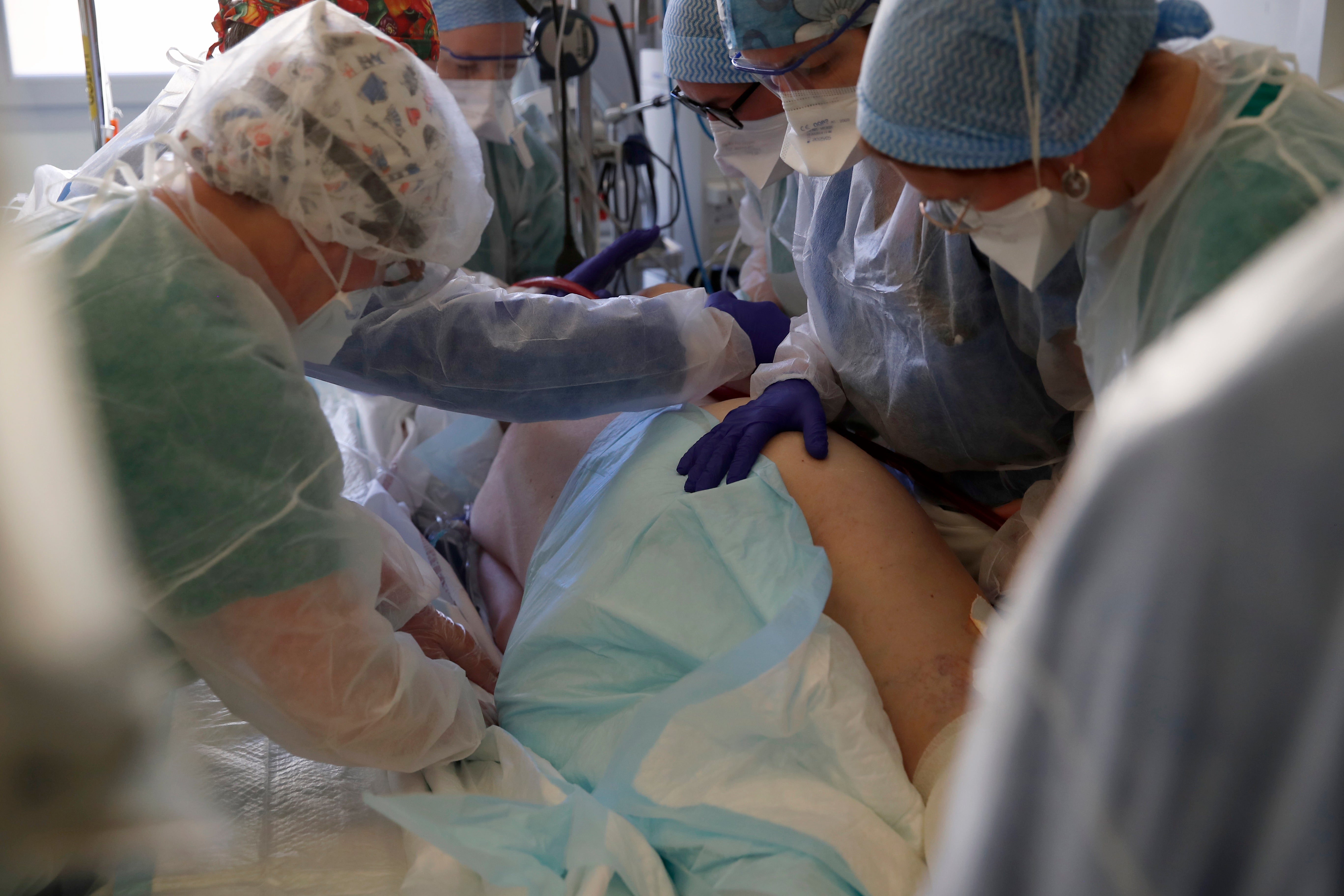French virus surge raises harrowing specter of ICU overloads
Surging infections in France are increasingly raising the specter of hospital intensive care units running short of beds

When French President Emmanuel Macron holds his coronavirus strategy meeting this week, some of the figures at his disposal from overburdened hospitals will show why doctors are bracing for the possibility of unprecedented misery from rampaging infections.
Internal projections by the Paris public hospitals authority, some of which were seen by The Associated Press, suggest that intensive care units in the region of 12 million people may soon have to find space for more critically ill patients than ever. Nationwide, the number of ICU patients has already eclipsed the levels of France’s last deadly surge i n autumn.
Increasingly, hospital indicators suggest that this new surge risks becoming the worst one yet, raising the pressure on Macron to reverse course and lock down the country once again, as he did in October and November.
At Bichat Hospital, one of Paris' biggest, Dr. Aurelie Gouel's job of finding space for surgeries in its rabbit-warren of operating rooms is getting harder. Her phone rings constantly with requests for increasingly squeezed resources. Half of the ORs have been shut down this week to free up staff and space for COVID-19 care, Gouel said.
“The hospital isn’t big enough to absorb the people who are sick," she said Tuesday. “We’re under pressure to open extra beds but can't do that with health care workers who are exhausted."
Less-urgent procedures like hip replacements are being postponed. “Even if the patient is in pain, and I understand that being in pain is a real problem, they will have to wait," Gouel said.
Outside the capital, ICU wards are also at the bursting point. Virus patients occupy all 16 regular ICU beds at the main hospital in Amiens where Macron was born and schooled. Ten more temporary ICU beds set up this month in a pediatric wing for non-COVID-19 patients are mostly also full.
Dr. Michel Slama, the ICU deputy head, said Tuesday that at the current rate of admissions, and without stricter virus control measures, his hospital could soon be facing its worst battle with the virus to date.
"See that slope? See how sharp it is?” he said, pointing to a chart of virus infections and hospitalizations in northern France, including the Amiens region.
In the ICU, relatives circled in silence around the bed of a 60-year-old man close to death.
The French situation echoes the recent experience of Britain, which saw infections surge in December as a more contagious virus variant took hold, before then spreading in France and elsewhere in Europe. But where British Prime Minister Boris Johnson responded by locking his country down again, Macron has instead pursued a strategy of trying to contain infections with softer measures and to outrun them with vaccinations.
An overnight nationwide curfew has been in place since January. In Paris and other regions where the virus is spreading rapidly, residents also have extra restrictions on movement and nonessential stores are closed.
Doctors want even stricter controls, warning that surging infections could soon overwhelm their ability to care for the sick and force them to choose which patients they have resources to save.
When Macron and his ministers and aides meet Wednesday, closing schools will be up for discussion. That's an option his government has described as a last resort and resisted since a switch to online teaching in France's first lockdown in 2020 proved particularly damaging for underprivileged kids and contributed to an explosion of child mental health issues.
The government says it wants to avoid reaching the point where ICU doctors have to turn patients away. “The absolute red line is triaging of the sick,” the economy minister, Bruno Le Maire, said Tuesday.
But doctors say the red line is rushing closer. The Paris hospital authority projections seen by AP point alarmingly upward. They forecast that by Friday, the region's ICUs could have nearly 2,000 patients in care, up from 1,484 on Monday. That is beyond the peak of 1,138 patients that Paris-region ICUs absorbed in the last surge that forced France's lockdown that lasted until mid-December.
Other longer-term projections are darker still, pointing to unprecedented potential peaks of more than 3,400, or even 4,400 ICU patients in the Paris region by mid- to late April, said a hospital crisis director who has seen the forecasts and who spoke about them on condition of anonymity because they were internal. The director said the mere thought of so many gravely ill people to care for — which would be way beyond what Paris hospitals absorbed when the virus first hit in 2020 — was mind-boggling.
Other doctors say hospitals won't turn critically ill patients away but won't be able to offer their best care.
“Regardless of whatever political decision is taken, we are heading for the wall," Gilles Pialoux, the head of infectious diseases at the Tenon Hospital in Paris, said Tuesday on France Inter radio,
“The care on offer will be degraded, degraded for everyone, COVID and non-COVID alike," he said. "To the point, if we let it keep climbing, that we’ll be in a situation like Lombardy (Italy), where families will understand that patients are going to die on gurneys. That is what we want to avoid.”
—-
Leicester reported from Le Pecq, France, and Charlton reported from Amiens. Associated Press writer Jill Lawless in London contributed.
___
Follow AP’s pandemic coverage at:
https://apnews.com/hub/coronavirus-pandemic
https://apnews.com/hub/coronavirus-vaccine
https://apnews.com/hub/understanding-the-outbreak